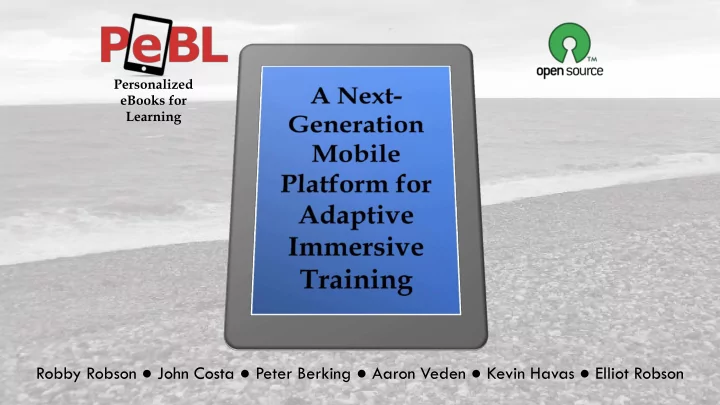

Personalized eBooks for Learning PeBL PI Meeting 2018 Robby Robson ● John Costa ● Peter Berking ● Aaron Veden ● Kevin Havas ● Elliot Robson
How eBooks Work Provides display, Software (free) “Reader” sensors (e.g. GPS), implements reader communication, and functionality and “Book” physical interface accesses device HTML5 (for EPUB3 Content and HTML5 is executed conformant books) organization by the Reader – (created using permits added authoring tools) functionality Device
eBooks Tomorrow Today • Based on a standard (EPUB) now • Used to provide electronic (DRM- being updated in the W3C. controlled) access to publisher content. • Supported by an ecosystem of • Adopted and supported by the digital readers and authoring tools publishing industry. EPUB 3 CAN PROVIDE A LOT OF AFFORDANCES! Readability and Mobility and sensor Learning analytics organization of eBooks capabilities of tablets and social interaction
Advantages of eBooks as a platform Challenges for eBooks as a platform for adaptive immersive training for adaptive immersive training • Mobile • Complexity Meets the needs of modern learners and is ! Multiple OS (iOS, Android, Windows) ideal for field use ! Multiple devices (Desktop, Apple, Android etc.) • Networked ! Many readers, most with limited functionality Learners and instructors to communicate with • Authoring each other and with experts (text & voice) eBooks can share data and support multi- ! Tools are designed for creating traditional eBooks - player exercises requires coding to implement features on left • Adaptative • Standards Can adapt based on location, light conditions, ! No standards in EPUB3 for integration, results learner goals and learner profiles reporting, adaptation, etc. • Integrated Integrates with other training systems and reports granular data for a range of analytics Similar to the early days of • Interactive web-based learning! Can include standard quizzes and can embed games, simulations, virtual labs, etc.
PeBL: Personalized eBooks for Learning (Converging standards and tools to achieve a vision) • Open source project (www.peblproject.org) • Funded by the Advanced Distributed Learning (ADL) initiative (www.adlnet.gov) • PI: Elliot Robson (Eduworks Corporation) • Existing implementations • Extension Foundation (www.extension.org) • ADL in its Total Learning Architecture research • In progress • Primary output for the ADL is the PeBL specification • US Marine Corps • Related IEEE Standards Association activities • US National Park Service • The Industry Connections Actionable Databook (concluded) • IEEE Learning Technology Standards Committee (P7919.1) • US Navy Education and Training Command
Cybersecurity PeBL Book Developed to show “Tier 2” functionality (explained later)
DASHBOARDS: LEARNING ANALYTICS AT YOUR FINGERTIPS
Learning Record Book xAPI xAPI Dashboard Store xAPI Learner Profile CaSS APIs www.cassproject.org
Field Notebook Use Case • Ask an expert • Find resources • Discussion • Content brokering
HOW DOES THIS ALL WORK?
ROADMAP • Authoring tools • Security & privacy • Adaptive immersive environments • Live – Virtual – Constructive • Learning Continuum and Performance Analytics (LCaPA) • Synthetic Training Environment • Intelligent Tutoring Systems (integrations)
www.peblproject.org WRAP-UP • EPUB 3 is an ideal platform for adaptive immersive training • Its state is similar to that of online learning in the early days of the Web • We need tools and standards to address the diversity of devices and readers • PeBL (Personalized eBooks for Learning) is an open source project funded by ADL • PeBL books are networked, adaptive, and interactive – following the PeBL spec • Standards efforts include EPUB 3 (W3C) and Mobile Platforms for Learning (IEEE) • Existing implementations show the potential – the roadmap includes LVC, STE, etc. PI: Elliot.Robson@Eduworks.com PM: Kevin.Havas@Eduworks.com
Recommend
More recommend